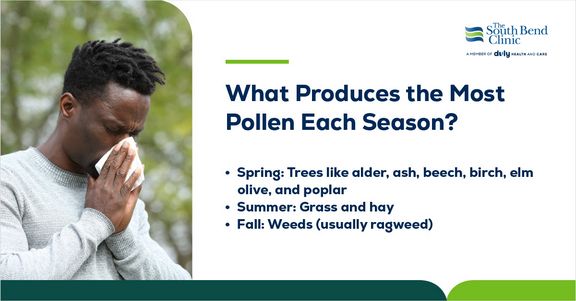It’s that time of year you always dread: You’ve woken up with a scratchy throat, a stubborn cough, and a whole lot of congestion.
If you have seasonal allergies — also called allergic rhinitis or hay fever — you’re not alone. Millions of Americans have allergies that come and go with the seasons.
Despite how common allergies are, there are many misconceptions about them. Here’s the truth behind some of the most common allergy myths:
Myth: People with seasonal allergies should be mostly concerned about flowers.
The most common trigger of seasonal allergies is a yellowish powdery substance called pollen. Pollen particles can make their way into your lungs, nose, or eyes, where they can cause symptoms if you are allergic to pollen.
Flowers are well-known producers of pollen, but pollen can be created by many types of plants. Seasonal allergies tend to be caused by the pollen made from trees, grass, or weeds.
Myth: Spring is the worst season for allergies.
There isn’t one “worst” season. It’s true that many people experience their worst allergies during the spring, but others find that summer or fall are the most uncomfortable. This is because different pollens are created in each season:

There also isn’t one “worst” month within each season, since the exact timing of an allergy season varies across the country.
Myth: If you have seasonal allergies, you’re basically stuck inside until the season is over.
There are certain times when it might be best to stay inside, but that doesn’t mean you can never enjoy the outdoors.
Some people find it helpful to check the day’s pollen count before deciding whether or not to go outdoors for a long period of time. This is a measurement of how much pollen is in the air. You can find the daily pollen counts on The South Bend Clinic homepage. Additionally, there are several websites where you can find both current and forecasted pollen counts, such as the National Allergy Bureau and Pollen.com. Some smartphone weather apps also include information about pollen counts.
If you do need to spend time outside on a high-pollen day, there are several precautions you can take to minimize your symptoms:
- Wear a face mask
- Keep your grass short — but try to leave the actual gardening to someone who doesn’t have allergies
- Rinse off when you come inside
- Brush your pets after they’ve gone outdoors
It’s also a good idea to keep short-term symptom relief medications like decongestants on hand.
Myth: You don’t need to start allergy medications until you start having symptoms.
Allergy medications don’t just treat symptoms — they can prevent them, too.
The key is to start taking them early on. If you already know you have allergies, start them two weeks before you expect your symptoms to begin. This allows your body to get used to the medication so you can get the most benefits out of it.
To learn more about relieving allergy symptoms, make an appointment with a South Bend Clinic allergy specialist.
Myth: Allergy medications always make you tired
Antihistamines — medications that block a symptom-causing chemical called histamine that your body releases when having an allergic reaction — are among the most effective allergy medications. They have a reputation for making you sleepy, but that’s not always the case. There are non-drowsy antihistamines, like fexofenadine (Allegra®), loratadine (Claritin®), and cetirizine (Zyrtec®), that are less likely to tire you out.
Also, not all allergy medications are antihistamines. Many other types aren’t known for causing drowsiness, such as corticosteroids that block inflammation related to allergies, immunotherapy shots that train your immune system not to respond to allergens, and decongestants that provide fast, temporary relief for sinus congestion.
Myth: Since decongestants (like Afrin® and Sudafed®) are available over the counter, they are always safe to use.
Decongestants provide relief for a stuffy nose or clogged sinuses. Many are available over the counter as pills, liquids, or nasal sprays. While decongestants can be great for quick symptom relief, they should not be used on a long-term basis — and some people should avoid certain decongestants altogether.
There are a few types of decongestants, and each comes with their share of potential risks:
- Oxymetazoline (Afrin® Nasal Spray or Zicam® Nasal Spray) can cause rebound congestion — when congestion returns and is worse than before — if used for more than 3 days in a row.
- Oral decongestants like pseudoephedrine (Sudafed®) or phenylephrine (Sudafed PE®) shouldn’t be taken for more than 7 days in a row. Over time, oral decongestants can raise your heart rate and blood pressure, which can increase your risk for serious complications like heart attacks.
- Don’t take oral decongestants if you have uncontrolled or severe high blood pressure. Check with your provider before taking decongestants if you have heart or thyroid problems, diabetes, glaucoma, difficulty urinating because of an enlarged prostate, or are pregnant.
Myth: You can’t develop allergies later in life.
Allergies tend to develop earlier in life. However, allergies can ebb and flow, or not even show up until adulthood.
There are several reasons why this can occur, such as:
- Weakening immune system: As you age, your immune system gets weaker and can increase your likelihood of developing diseases, including allergic reactions.
- Medication changes: Some medications for conditions like anxiety or insomnia contain antihistamines. If you stop taking them, you might notice symptoms that were once masked by the medication.
- Stress: Aging or lifestyle changes can cause or worsen stress, and that can trigger allergy flare-ups.
- Moving to a New Environment: You may move to a new place where you’re exposed to a different environment and new allergens.
No matter when you develop them, seasonal allergies can make you feel anywhere from slightly uncomfortable to downright lousy. But you don’t have to be miserable. There are ways to ease or prevent symptoms.
An allergist or primary care provider can help you find the most effective way to manage your allergies. Until then … grab a box of tissues.
Health Topics:







